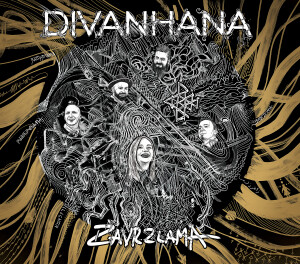 Divanhana is a Bosnian sevdah band founded in 2009 by a group of students from the Sarajevo Music Academy. Fronted by powerful and supple singer Šejla Grgić, they play folk and “urban traditional” music from Bosnia and Herzegovina, as well as Sevdalinka style folk music from the whole ex-Yugoslavia region including Croatia, Montenegro, North Macedonia and Serbia. Sevdalinka, often called “Bosnian blues,” is a form of (usually unrequited) love song dating to the 16th century.
Divanhana is a Bosnian sevdah band founded in 2009 by a group of students from the Sarajevo Music Academy. Fronted by powerful and supple singer Šejla Grgić, they play folk and “urban traditional” music from Bosnia and Herzegovina, as well as Sevdalinka style folk music from the whole ex-Yugoslavia region including Croatia, Montenegro, North Macedonia and Serbia. Sevdalinka, often called “Bosnian blues,” is a form of (usually unrequited) love song dating to the 16th century.
On Zavrzlama, their sixth album, they combine those traditional elements with influences from pop, jazz, modern classical and roots music from other regions. It’s a winning blend for the most part, and this entire ensemble has impressive talent. In addition to Grgić on vocals, Divanhana is Neven Tunjić on keyboards, Nedžad Mušović on accordion, Azur Imamović on electric and acoustic bass, Adin Taletović, guitar, and percussionist Irfan Tahirović.
Divanhana recorded this music in Slovenia in February 2020, just before the first lockdown of the COVID-19 pandemic. Once they were able to get back together, they listened to what they had recorded and liked what they heard, so they set about mixing and preparing it for release.
Šejla Grgić has a beautiful voice capable of swooping from a piercing soprano to a husky alto. The opening trio of tracks offer a perfect showcase, particularly the first track “Na Kušlatu Se Mahrama Vihori, written by Tunjić. The slowly sung rubato-like sections build tension until the whole band joins, with multi-tracked accordion and some amazing cello from guest players Lana Kostić and Duygu Demir. Carlos Yoder’s tabla gives it a nudge out of the Balkans into territory further south.
The second track “Ćilim” is just wild Balkan folk dance music at its best. Written by the band with lyrics by Bosnian singer and composer Samir Śojko, this horo is sure to get everybody up and dancing.
It’s followed by an equally danceable track, this one in a frenzied 9-beat rhythm, “Peno” by the legendary Saban Bajramovic. Speaking of legends, they also take on “Ópa, ópa,” written by the world renowned Serbian composer Radivoje Radivojevic. This one they spice up with a horn section and an unexpected Latin beat and percussion. They also giver a fresh makeover to “Sarajćice, hajdemo,” by the late Jozo Penava, another great sevdah composer. This one’s basically a hot polka, driven by some non-traditional instrumentation including acoustic guitar (very Django-like) and especially banjo! “Lola” starts out sedately, as a lilting blend of Sevdah, tango and bal musette – and stays that way for a long time. Then in the last two minutes (out of five) it becomes a whirling dervish of uptempo Balkan dance, before settling back down for a quietly dramatic denouement.
Rather surprisingly, the high points of Zavrzlama come near the end. Three tracks in a row (leading up to the ballad that ends the album) take things higher and higher until you think they can’t go any higher. Both “Zarasle su staze ove” and “Oj, curice” are quick-stepping whirling folk dances interspersed with dramatic slow vocal sections, which to me is the epitome of sevdah. They cap it off with another one written by keyboardist Neven Tunjic, “Voće Rodilo.” This dramatic folk song in a soaring nine-beat rhythm has some impressive unison playing of double-time runs on accordion and guitar, and a great accordion solo – too many highlights to mention, really.
Any dance party or record needs a couple of slow numbers interspersed. Here they’re “Stade se cvijece rosom kititi” and the final track “Zova.” Both have what to me is a Euro-pop sound – from the production, the slightly cheesy electronic keyboards and especially the lowing fretless bass – definitely not my thing, but it’s well done if you like that sort of music.
A lot of Balkan music made its way to the U.S. in the early 2000s, but that trend seems to have peaked long ago and the releases that make it to these shores have slowed to a trickle. It’s great to have a new release by a young, energetic band like Divanhana that respects tradition but continues to push the music in new directions. Zavrzlama is a welcome blast of Balkan dance fun to start the year. Oh, and you should definitely spring for the physical product – LP or CD. It’s a well designed and generous package with notes about the songs and a nice essay by Garth Cartwright, U.K. journalist and author of one of the definitive books on Roma music from the early 2000s, Princes Amongst Men. For more, follow the link to the label’s website below, and you can learn a lot more at Divanhana’s website.
(CPL Music, 2022)
